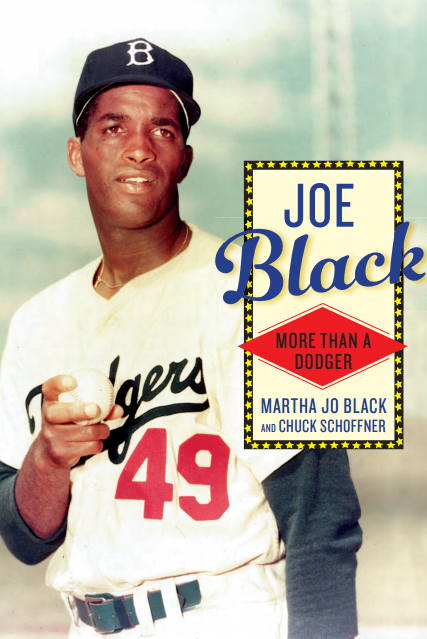| « New Blackhawks Looking to Help Team as Playoffs Approach | Review: Before the Ivy: The Cubs' Golden Age in Pre-Wrigley Chicago » |
Baseball Mon Mar 09 2015
Review: Joe Black: More Than a Dodger
 I had never heard of Joe Black.
I had never heard of Joe Black.
I knew nothing about the first African-American pitcher to win a World Series game. I was unaware of the man who, after finally reaching the big leagues at 28, nearly won the 1952 National League MVP as a rookie. I was clueless about the gregarious gentleman who was a major part of both professional baseball and the Greyhound Corporation for decades after his playing days ended. I didn't know about all the lives he touched.
But, as I got towards the end of his biography, Joe Black: More Than a Dodger by Martha Jo Black (his daughter and coordinator of Fan Experiences for the White Sox) and author Chuck Schoffner, I not only learned about Joe Black, I came to admire him.
The book, released in February, is an intricate look at Black's life. About half of the book, in alternating chapters, is based around his 1952 season. The Brooklyn Dodgers were flat that season before Joe (as he's called throughout the book) showed up. A reliever, Joe recorded a 2.15 ERA, pitched out of dozens of jams and put the team on his back down the stretch as the Dodgers held on for the pennant.
Dodger begins, though, with the highest point of Joe's life, and one of the most important moments in baseball history. Joe wins Game 1 of the World Series with a complete game. He not only gave the then-hapless Dodgers a real shot at taking the title, he also became the first black pitcher to win a game in the Fall Classic.
The rest of Dodger gets into everything else about Joe. He grew up poor in Plainfield, New Jersey, but pushed himself through college at Morgan State University, the Army and the Negro Leagues before reaching the Dodgers farm system in the early 1950s. Joe not only had his own obstacles to conquer to reach the majors, like learning how to become a "pitcher" and not just a "thrower," but he also had to deal with segregation and Jim Crow laws in the minors.
After his career ended, he used his name recognition as a way to get into helping people, first as a teacher, then as an executive Greyhound Bus Corporation, and later as a leader of the Baseball Assistance Team (BAT), a group that gave money to retired Major League players.
The best way to describe Dodger is that if you have the book, flip it open to any random page and you'll be sure to find at least one or two interesting anecdotes. It is filled with stories, both long and short, both funny and sad.
Joe couldn't afford his own cleats as a kid, so he wore his friend's too small spikes before the soles split off while he legged out a triple in a sandlot game. Thoughout the early part of his life, Joe experienced racism, including when scouts passed over him while in high school and when he was barred from entering an all-white church while at college. While in the Army, he was harassed and had to avoid a lynching while walking around a town in Texas. In the Negro Leagues, Joe and his teammates would pool their daily meal money ($2) together to buy bread, mayo, lunch meats and Pepsi for meals on the road.
As a pro he roomed with fellow Dodger Jim Gilliam and barnstormed with teammate and hall of famer Roy Campanella. Ted Williams and Stan Musial each told Joe they were impressed with his pitches. As an exec with Greyhound, he comped a bus ticket to a young desperate comedian, who turned out to be Sinbad. He gave Bobby Bonilla a batting tip before the Marlin hit a home run in Game 7 of the 1997 World Series. Joe called Frank Robinson, Jerry Reinsdorf and Bill Cosby friends. And, the chapter on offseason baseball in Cuba in the early 1950s could really be expanded into its own book, if it hasn't been already.
What's striking about the book is the amount of research involved. Although Joe died in 2002, Schoffner and Black spoke with everyone he could to get enlightening quotes. The authors drew heavily from Joe's 1983 autobiography, Ain't Nobody Better Than You, numerous baseball books, and a multitude of newspaper and magazine articles from the time, really recreating the scenes as well as he could.
The book isn't perfect, though. At times, it has a little too much detail, like with the many game recaps from the 1952 season. I found myself skimming over them if they didn't move the story along. But all together it was a good book and a quick read. It's available in bookstores and on Amazon. If you like baseball, the Dodgers, looks into the Civil Rights era, or even just vivid collections of stories, you'll enjoy this book. You'll get to know all about Joe Black.








